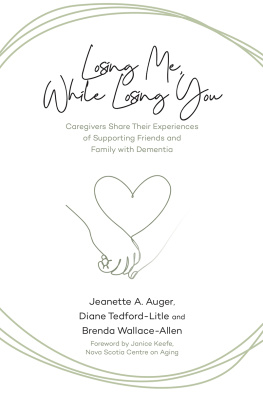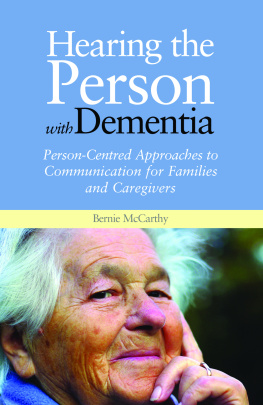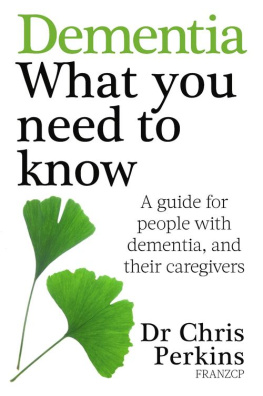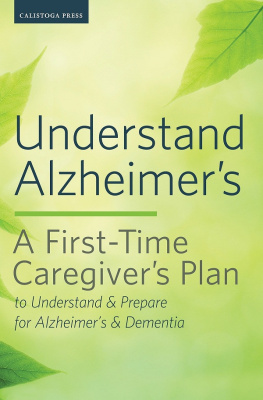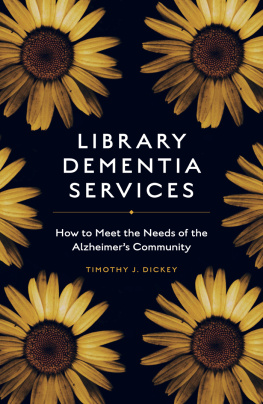Caregivers Share Their Experiences of Supporting Friends and Family with Dementia
Copyright 2021 Jeanette A Auger, Diane Tedford-Litle and Brenda Wallace-Allen
All rights reserved. No part of this book may be reproduced or transmitted in any form by any means without permission in writing from the publisher, except by a reviewer, who may quote brief passages in a review.
Editing: Lisa Frenette
Text design: Brenda Conroy
Cover design: John van der Woude
eBook: tikaebooks.com
Printed and bound in Canada
Published by Fernwood Publishing
32 Oceanvista Lane, Black Point, Nova Scotia, B0J 1B0
and 748 Broadway Avenue, Winnipeg, Manitoba, R3G 0X3
www.fernwoodpublishing.ca
Fernwood Publishing Company Limited gratefully acknowledges the financial support of the Government of Canada, the Canada Council for the Arts, the Manitoba Department of Culture, Heritage and Tourism under the Manitoba Publishers Marketing Assistance Program and the Province of Manitoba, through the Book Publishing Tax Credit, for our publishing program. We are pleased to work in partnership with the Province of Nova Scotia to develop and promote our creative industries for the benefit of all Nova Scotians.

Library and Archives Canada Cataloguing in Publication
Title: Losing me, while losing you: caregivers share their experiences of supporting friends and family with dementia / by Jeanette A. Auger, Diane Tedford-Litle and Brenda Wallace-Allen; foreword by Janice Keefe.
Names: Auger, Jeanette A., 1945- author. | Tedford-Litle, Diane, author. | Wallace-Allen, Brenda, author. | Keefe, Janice, 1963- writer of foreword.
Description: Includes bibliographical references.
Identifiers: Canadiana (print) 20210259558 | Canadiana (ebook) 20210259701 | ISBN 9781773634845 (softcover) | ISBN 9781773635019 (EPUB) | ISBN 9781773635026 (PDF)
Subjects: LCSH: DementiaPatientsCare. | LCSH: DementiaPatientsFamily relationships. | LCSH: Caregivers.
Classification: LCC RC521 .A94 2021 | DDC 362.1968/31dc23
Contents
Acknowledgements
W e sincerely thank the caregivers who so openly shared their experiences with us, especially in the difficult time of a pandemic, and who did so because they wanted their experiences to be shared with others who may have similar experiences now and in the future.
From Fernwood, we thank Errol Sharpe for his continued support and encouragement of our endeavours. As well, we appreciate Beverley Rach, who once again guided us through the publishing process. Our thanks go to Lisa Frenette, who was our copy editor, Debbie Mathers and to Brenda Conroy for her involvement and expertise, which always make our work so much better.
We thank our friend and computer guru Terry Aulenbach for ensuring that all the correct publishing guidelines were met and adhered to and for doing so with patience.
We thank each other for our support and understanding as we each experienced health care challenges while going through the research and writing process, but we were determined to share the experiences of the caregivers for whom we have so much respect and admiration.
Kirstie Creighton, manager for Program Development at the Alzheimer Society of Nova Scotia, was very helpful in providing resources, and we thank her for her considerate attention to our requests. Dr. Janice Keefe, chair of the Nova Scotia Centre on Aging at Mount Saint Vincent University and chair of the provincial expert panel on long-term care in Nova Scotia, kindly agreed to write the foreword to this book, and we are deeply gateteful that this very busy, proficient and prolific woman took time to do this.
Foreword
A lzheimers disease and other related dementias have rightly gained importance in the academic milieu as well as our day-to-day society. In Nova Scotia alone, it is estimated that nineteen thousand people develop dementia every year. Losing Me While Losing You is an insightful entry into the lives of the people who care for persons with dementia. Caregivers have often been called the backbone of our health care system, supporting those who need assistance.
In Canada, 80 percent of the support provided to older people in need of assistance comes from family and friends. The care provided to persons living with dementia by their family and friends enables them to live far longer in the community than would be possible. Even when care needs become so great that nursing home admission is needed, family continue to provide essential emotional and physical support and contribute to their quality of life. The knowledge gained through interviewing caregivers is critical to help improve support for both the caregivers and the persons with a dementia diagnosis.
The organization of this book follows the stages of the journey as seen through the eyes of the caregivers: Noticin g, Responding, Assistance and Support, and Observations and Recommendations. Chapter 6 is a compendium of resources and supports available to caregivers. There are many strengths to the content one is diversity of the caregivers interviewed. They represent different ethnic and cultural experiences, and they have a variety of living arrangements, geographies, education and relationships with the person they are caring for be they wives and husbands, mothers and fathers, from large families or small.
Not so long ago, it was taboo to speak about our experiences of dementia the noticing stage that the authors bring to life through the words of the caregivers help us to identify the multiple ways in which the disease is first manifest. In the recent past we would have been in denial of the disease, afraid that by speaking about it we will it to happen or somehow it is the fault of the person with dementia. Indeed, some groups may still be in denial because of fear, because they feel that nothing can be done to turn the tide of dementia progression. Nothing could be further from the truth. Some types of dementia can be stabilized through medication. For others, the knowledge of cognitive impairment provides an opportunity for family and the person with the diagnosis to discuss future plans and preferences. Rather than hide behind closed doors, the thirty-five caregivers in this book offer insights into the process of noticing, how they responded and their encounters, good and bad, of seeking assistance and support.
The wealth of information on support and resources throughout the book will be beneficial to anyone who is currently a caregiver or is studying how to support people with dementia and their caregivers. Caregivers provide insightful recommendations on lessons learned, coping strategies and what government can do to best support caregivers. The positive personal growth caregivers experienced through their journeys is another valuable lesson from the book one that is often overlooked in research literature.
From the personal to the societal response, the authors descriptions of the caregivers experiences reveal a patchwork of programs and services in Nova Scotia. This is in contrast to the long history of national dementia strategies across the globe and across the provinces within Canada. The chapter on resources is comprehensive in its examination of leading-edge initiatives such as dementia villages, dementia-friendly communities, memory care facilities, geriatric clinics and a host of other initiatives. It also tackles the under-recognized topics of the impact of race and ethnicity on dementia care. Understanding the intent and scope of these resources is essential for anyone working in this field.

